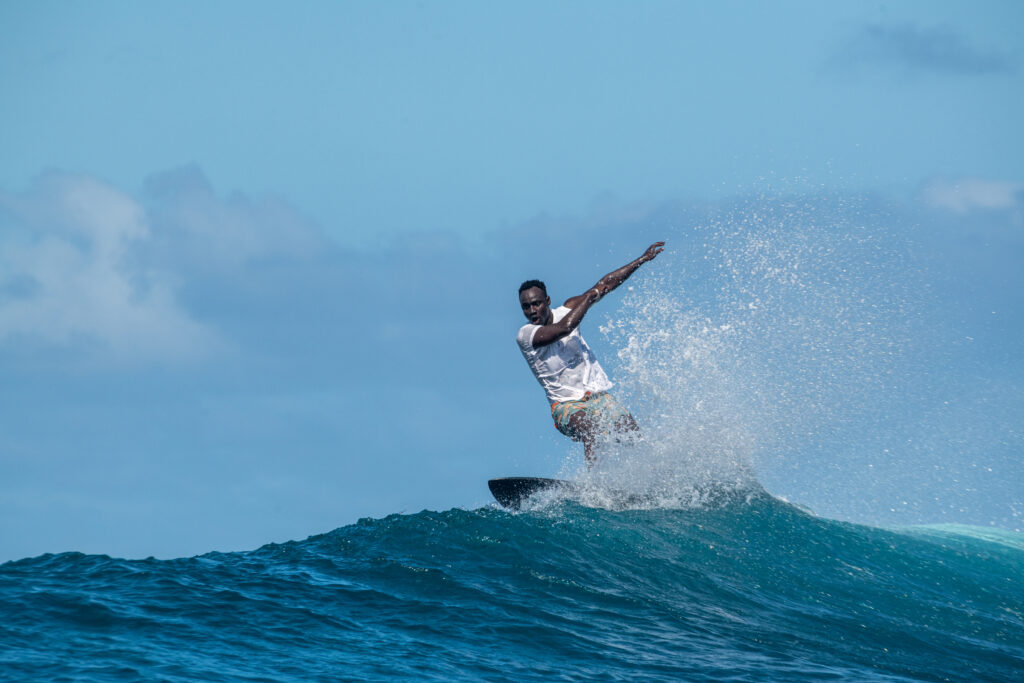Babacar Thiaw on community ocean stewardship, conservation education, and Senegal’s development tensions.
Surfer and environmental advocate Babacar Thiaw is the founder of Senegal’s first zero-waste restaurant and surf camp, Copacabana Surf Village – a project that has since inspired restaurants across Dakar to follow a more sustainable path. As the founder of the Surfrider Foundation‘s Senegal chapter, he leads youth education programs and community initiatives aimed at reshaping how people interact with the environment.
In our conversation, we dive into the challenges confronting Senegal’s coasts – from overfishing and depleted fish stocks to the waste that continues to wash onto beaches despite the country’s 2020 ban on single-use plastics. Babacar speaks to the frustration of witnessing pollution accumulate on his home breaks, but also the resolve that keeps him committed to the long journey of coastal restoration.
For Senegalese surfers, fisherfolk, and those whose daily lives unfold against the backdrop of the city’s coastline, the ocean is a living center of community, connection, and joy. Babacar’s remains focused on the essential work of teaching and organising, reminding people that to protect the ocean is to protect a legacy that sustains life itself, and surfing can be at the heart of that protection.
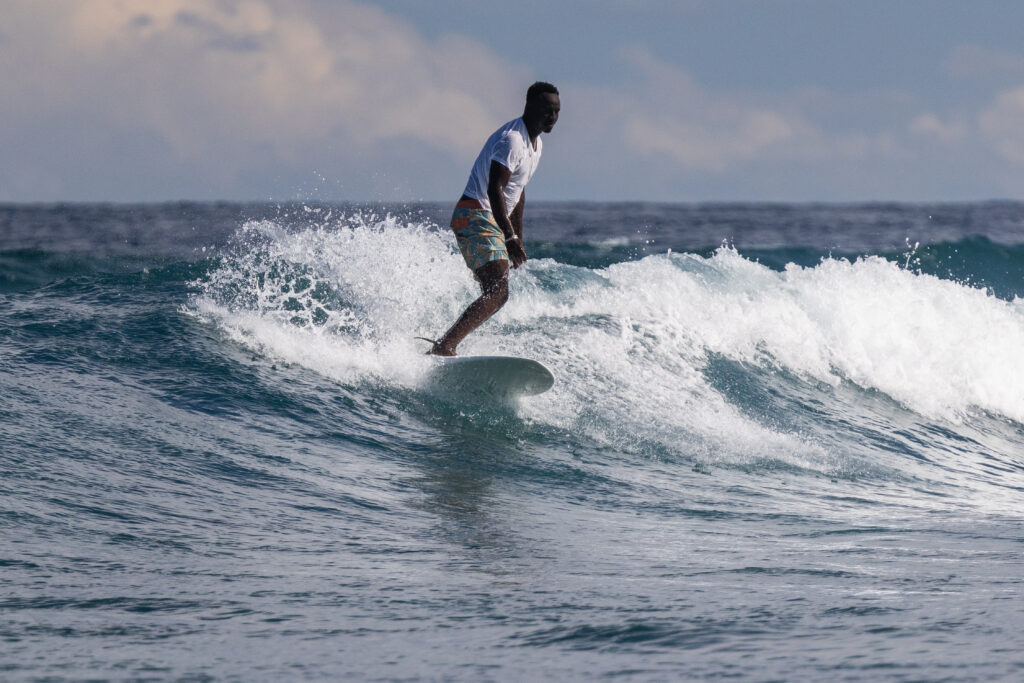
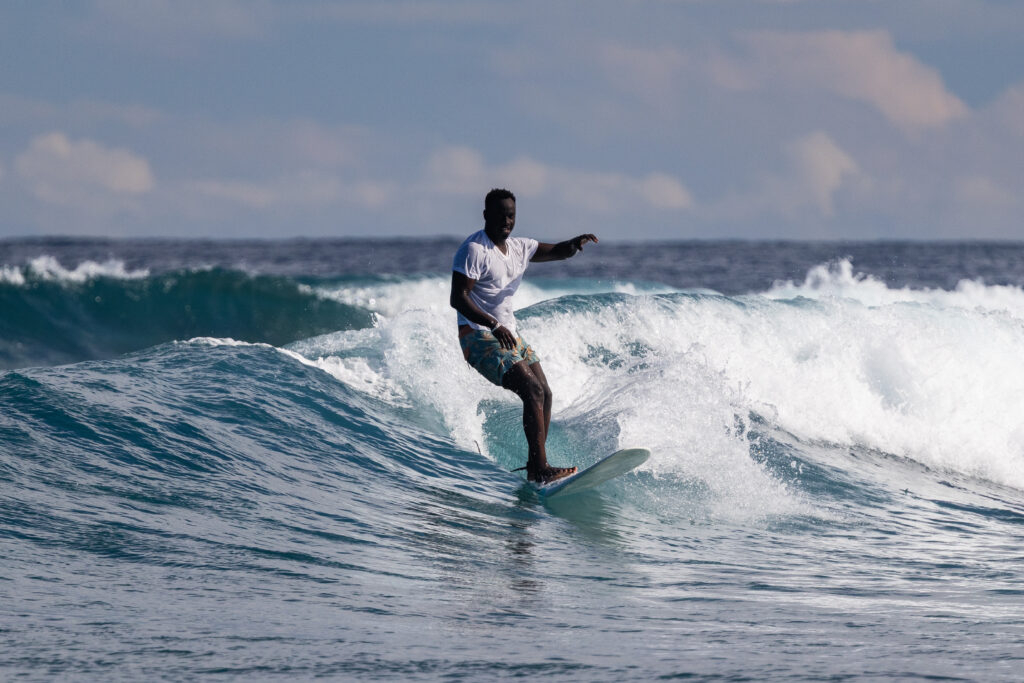
Lukas Brunner: Hi Babacar, what was it like growing up in a place where the ocean plays such a big part in community life? And, how has surfing shaped your connection to the ocean?
Babacar Thiaw: Growing up, the ocean was literally my playground. The ocean was and is like a meeting ground, the center of many things to us. It’s the center of recreational activities and survival. We all get our food from the ocean. There’s a whole circular economy around it, so it’s definitely a very important part of our life.
My grandma was the best, she would always share whatever her husband fished with others in the village – some people did agriculture and others went out to sea. Seeing her make those gestures meant everything to me. I lost my mum at a young age so growing up with her and my Dad – among people who cared about their families and other families in the community – made me the person I am today.
I started surfing with a board a Spanish guy left for me. There’s something spiritual, something magical about being out in the water that I cannot explain. It’s something that is felt, a continuation of a beautiful legacy inherited from our grandparents. The only way to show our gratitude to them, is to protect that magic for the next generation and the ones to come.
“There’s something spiritual, something magical about being out in the water that I cannot explain. It’s something that is felt, a continuation of a beautiful legacy inherited from our grandparents.”
LB: How has surfing inspired your path in sensitising the public of the environmental challenges facing Dakar?
BT: I remember surfing on one particular day. I was in the water amongst mostly white tourists. Every time I sat on my board waiting for a wave, plastic floated around us. I thought, These people are here on vacation, but I live here. Is it going to be like this every time I surf? It drove me crazy.
Around 2006, Dakar’s population rose, but there wasn’t the proper infrastructure to support this – particularly waste management infrastructure – as well as planning policies to sustain the growth. In Yoff, we used to have a beautiful beach with white sand. People came from all over the country looking for opportunities on Dakar’s coastline yet there are no guidelines on how to run a fishing business, no water treatment centers, no one putting trash cans on the beach, no one making sure people aren’t leaving their waste everywhere. There just isn’t any system in place. The beach has changed drastically. There’s some imagery of these changes in the last project I worked on with Ben Ayers, Andrew Lynch, and Rush Sturges—The Human Side of Plastic. Deep in my heart, I just want to clear everyone off that beach – all those boats – move them somewhere, clean the beach, and take care of it properly, then let people come back with the right infrastructure in place.
Back then, I didn’t have any resources or knowledge about environmental work – I just kept talking about it. So after finishing my Master’s I focused on transitioning my father’s bar/restaurant into a zero-waste restaurant and surf camp with help from an association called Zero Waste Senegal.
LB: Let’s get deeper into waste management, what systems are currently in place to address waste in the city of Dakar, and more broadly, how is waste dumping affecting the country?
BT: Waste management is a big issue. There is a kind of social infrastructure, meaning [formal and informal] organisations do waste management work here in Dakar. What happens is that these organisations collect the trash throughout the city and bring it to an open landfill. At the landfill, normal people go there to recycle – they search for usable plastic, aluminum, clothes, and anything that’s valuable, and try to make a business out of it.
There are few policies and resources, but overall just a lack of competency in terms of handling the volume of waste. The policies currently implemented are just not adequate to handle the intensity of waste problems faced by Dakar and Senegal. At this point, I’m convinced that the government of Senegal either isn’t willing to do it properly, or they need help. Maybe we should just leave it to someone else to do it for us – outsource it. Because what the people here have been doing isn’t really satisfactory.
“At this point, I’m convinced that the government of Senegal either isn’t willing to do it properly, or they need help.”
I’ve been hearing that containers of trash are coming into Africa, but I don’t know exactly where they’re taking it. I haven’t seen any of those containers personally, just hear people talk about it. But I believe it because I’ve seen news about trash reaching the coast of Tanzania and Zanzibar. I know it’s happening here too, but it’s very secretive.
I think if it were more public, it would drive people nuts. We don’t even have a real trash treatment center for ourselves, and then we’re taking somebody else’s trash? It just doesn’t make sense to accept for it all to go to a landfill to harm the biodiversity, the air quality, and cause health issues. If so, it’s our governments that are letting this kind of thing happen: politicians are selling our lives, our health, and the future of the next generation. We have corrupt leaders who take money and we don’t even really talk about where the trash ends up.
LB: Overfishing is another theme central to the discussion of environmental challenges faced by coastal communities in the region. What are some of the impacts you’ve witnessed at the community level in Yoff and how do these spread across different regional scales?
BT: At the community level, what we see now is completely different from how it used to be. You could just go down to the beach and catch plenty of fish. Now, every fish that comes to shore is already packed and shipped—either to overseas markets or to Dakar. Even the people living right here by the sea don’t get any of that catch because it’s already bought up and sent away.
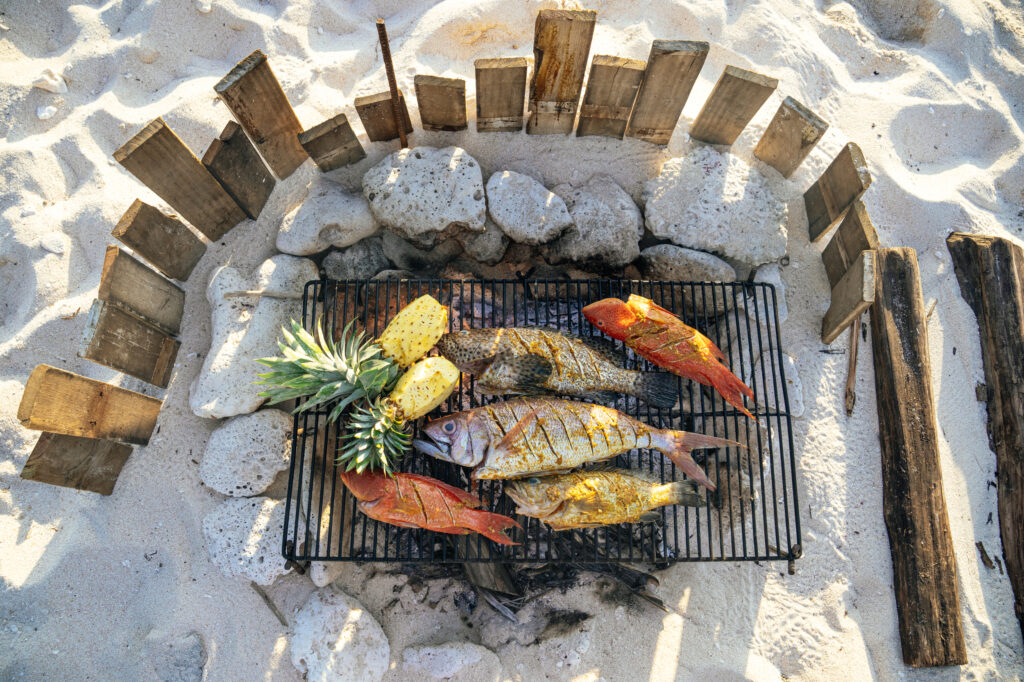
We’ve noticed the scarcity – there’s less and less fish here. Fishermen are forced to travel to other parts of Senegal, or even to neighboring countries, just to make a living. They go all the way to the borders of Guinea-Bissau, and sometimes that causes conflict with local communities – those aren’t our territorial waters.
This has been happening for at least 10 or 15 years now, and people have kind of gotten used to it. Everyone talks about the problem; everyone knows the fish stocks are declining. But no one really digs into the deeper reasons why. People just accept it and try to find alternatives. For young people, that often means leaving Senegal. Some of them just move regionally – to places like Guinea-Bissau or Mauritania, while others are trying to get to Italy, Spain, or France.
It’s much harder for the older generation. They don’t have the means or energy to migrate, so they’re barely surviving. It’s a real humanitarian issue. Imagine doing this work your whole life, and suddenly there’s nothing left – and no help either. People go door-to-door just to ask for food. Thankfully, we’re a close-knit community here. We support each other as much as we can. Without that sense of humanity and community, some people here wouldn’t have made it. But when it comes to migration, unless we fix the root problems it will not stop. People are taking risks because they have no other choice.
“When it comes to migration, unless we fix the root problems it will not stop. People are taking risks because they have no other choice.”
LB: Do you feel that collective action at the community level has the potential to respond to these complex, intersecting issues in Senegal?
BT: Community work and education are two key components, but they’re not enough and need to work alongside policy implementation. Policy should come first, and the rest should follow. We need a kind of guideline for society – that’s what we’re lacking, in my opinion. With the right legal framework, people will know they can be sanctioned or fined by the government or local authorities for certain behaviors. Once that’s in place, we can talk about education: cultivating the understanding that harming the ocean means harming biodiversity, which ultimately means harming ourselves.
Understanding that the plastic I’m throwing into the ocean is literally going to end up in the stomach of a turtle, a dolphin, or in the fish that we end up eating. Plastic is derived from oil and having oil in our bodies is nasty; these are basic things that we weren’t taught in school. People just assume the plastic around us is going to decompose. But it never does.
LB: Let’s talk about the zero waste restaurant that you piloted in Senegal. What were the biggest challenges you ran into while pushing for a different relationship with waste in your own business?
BT: I kept hearing people around me complain about the plastic everywhere but no one stopped to ask: What can I actually do about it? For me, action was the only way forward.
Creating the first zero-waste restaurant in Senegal was about survival. It was also about legacy, honouring what our ancestors passed down to us. I grew up with the values inherited from my grandparents – how they taught us to respect and honour the environment and stay connected to it – that was my drive.
One of the biggest challenges was getting the people around me – my employees – to see the vision. At first, they didn’t understand, and I had to stay on them constantly. I was serious and meticulous, but some people thought I was just a difficult boss. But at the end of the day, if someone wasn’t aligned with my vision, I had to cut ties and move on.
Another challenge was hygiene. Some people questioned whether the reusable products we use are sanitary. It’s a valid concern… but we all use silverware at home – it’s all in the mind.
And what happened in the end? We now have 38 restaurants in the city following this model. The impact is national, even global. It proves that you should never underestimate what one person can spark – one human being can ignite a whole movement.
You should never underestimate what one person can spark – one human being can ignite a whole movement.
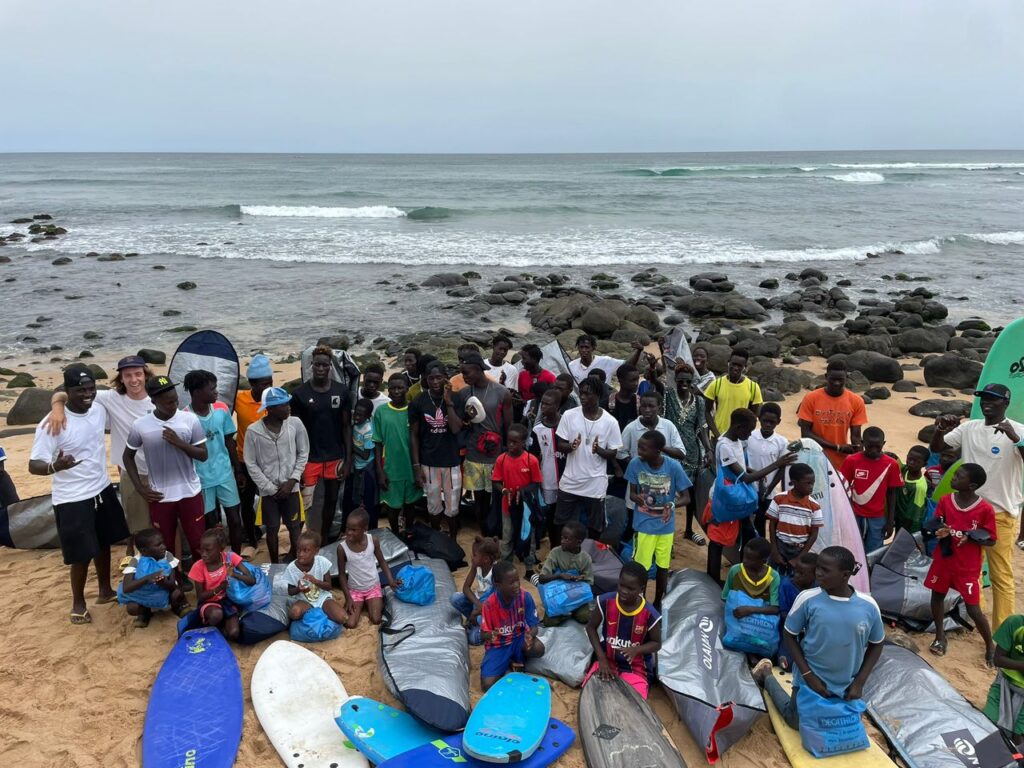
LB: What has the response been like from people in your community, but also from local city council officials?
BT: On the opening day of the Zero Waste Restaurant, the whole community showed up to support us. The only thing that upset me was that none of the officials from the city hall came.
Anyway, politics tends to be about “what can you give me, what can you do for me?” But I’m doing this whole thing for myself, my family, my people, and the next generation. Not because I expect something in return.
They do things, but it takes time. I’m not blaming them – I just don’t believe in their system. From what I see, maybe there’ll be results in 10, 15, or 20 years. But right now, they just move from one thing to the next. We need rigorous policy, legal frameworks, and ethical people rather than people chasing money or personal gain.
It comes back to our morals as humans. What’s important to us nowadays? We’ve all received education and values from our parents, but everyone’s just chasing the check and forgetting essential values. One day, the check will bury us.
LB: How do you think surfing can be a pathway to teach people about environmental struggles?
BT: Surfing’s been here for centuries, but not everyone does it. It’s anyone who is open and curious about that connection to the ocean. There’s this idea that only white people can surf – that’s not true, it’s a lie, man.
We’re bold, we respect the ocean. So definitely, surfing is emerging and people are coming together and making it like a way of life. And 100% it can be a tool for environmental education. All the people of the community here already know about pollution and sewage issues, because they’ve seen us doing beach cleanups with our surf school. We also invite other schools to join the effort, surfing brings everyone together.
If we use surfing the right way, it can transform lives.
